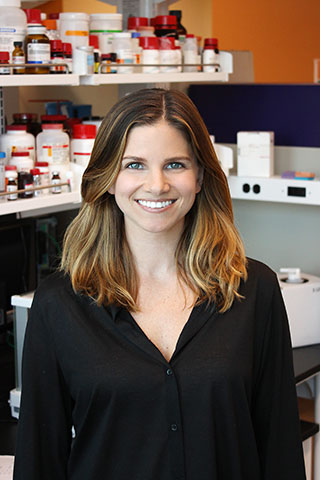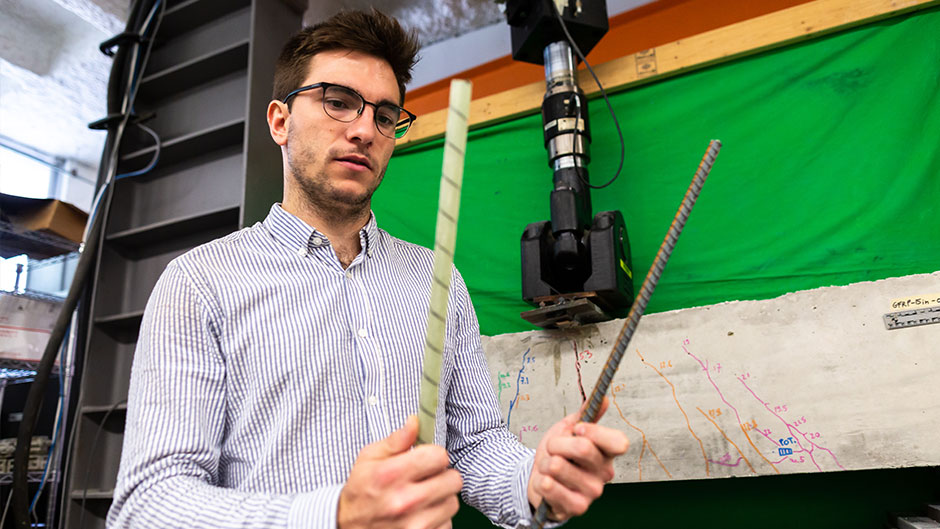What if there were a material that could help bridges and seawalls in Miami last nearly twice as long before repairs or replacements were needed?
It exists, and the material is called glass fiber reinforced polymer, or GFRP for short. The advantage of GFRP is that it does not corrode, so engineers across the world are starting to use it to replace steel bars in concrete structures. While steel rebar is typically used to reinforce roads and bridges, it corrodes quickly in areas near the ocean and in colder climates where deicing salt is used.
“Right now, the cost of repairing steel structures is huge,” said University of Miami civil engineering Ph.D. candidate, Alvaro Ruiz Emparanza. “So we want to use something that’s durable, sustainable, and that can help people avoid repair costs, as well as the inconvenience of repairing roads, which leads to traffic.”
Although engineers know that using GFRP can extend the lifespan and durability of structures, exactly how much longer it will last is still up for debate. This is what Ruiz Emparanza is investigating for his dissertation, which he will be presenting at the first annual Graduate and Postdoctoral Research Symposium Thursday in the Shalala Student Center.
“GFRP is very common in the aerospace industry, but we are now integrating it in civil engineering to create durable structures that don’t need to be repaired as much,” Ruiz Emparanza added. “And Miami is one place where this material has a lot of potential because it is surrounded by water, which is the ideal environment for the corrosion of steel.”

Meanwhile, biomedical engineering Ph.D. candidate Vera Mayo will outline her research on the elusive pathway of breast cancer cells after they spread from a tumor. With her adviser, assistant professor Ashutosh Agarwal, who is a member of Sylvester Comprehensive Cancer Center, Mayo is using acrylic chips to study how these cells spread to people’s bones. Although people with localized breast cancer — a removable tumor — have a 99 percent survival rate five years after treatment, if the cancer metastasizes before treatment, the survival rate drops to 27 percent, Mayo said.
“If we could see how these cells act in our chip, which should correlate to how they act in the body…it would help us tremendously to understand the whole process,” Mayo said. “Ultimately, we should be able to better treat metastasis and to determine the correct therapy for each patient.”
Students, faculty and staff can learn about the work of these students, among more than 60 other presenters at the half-day symposium, which begins March 7 at 12 p.m. and will conclude at 6:30 p.m. with an awards ceremony. The event is co-hosted by the Graduate School, along with the Graduate Student Association and the Postdoctoral Programs Office.
Graduate School director of education Tiffany Plantan said this new event will offer a rare chance for UM’s emerging researchers to share their work.
“This symposium was designed to bring the university community together on one day where early career researchers from all fields of study can showcase their scholarly and creative accomplishments to a broad audience, network with individuals across disciplines, exchange ideas, and make new connections,” Plantan said.
The half-day event will begin with keynote speaker Mary Woolley, president of Research! America,

the country’s largest nonprofit organization that advocates for research to improve one's health. The symposium will continue with a poster session, and an hour of TED-like talks featuring Ruiz Emparanza, Mayo and Hilary Yip, a music therapy master’s candidate who studied the use of martial arts with music and its effect on young men with autism. There will also be three simultaneous breakout rooms featuring oral presentations on the topics: Advancing Biomedical Research, Risk and Resilience Across the Life Course (featuring psychology and neuroscience projects), as well as Ecosystem Science.
Faculty and staff judges will be present in each presentation and awards will be given out at the end of the symposium for the presenter who delivers the best TED-like talk, as well as one winner for each of the oral presentation sessions, and several poster awards, which will be based on different categories of research (arts and humanities, social and behavioral sciences, engineering and physical sciences as well as health and life sciences), Plantan said.
Those interested in attending the Graduate and Postdoctoral Research Symposium can register here.
For detailed agenda and presenter profiles, visit https://umreseachsymposium2019.sched.com/

